The Policy Brief series
evidence for policy provides research highlights on important development topics.
No. 15 Research partnerships: the benefits of North–South collaboration
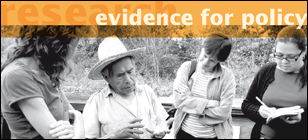
Partnerships between Northern and Southern researchers are a powerful tool for studying problems of global change and for shaping development policies. North–South partnerships enable teams of researchers to focus on specific problems and to strengthen research capacities in developing countries. They also enable Southern researchers to contribute to their home countries as part of an international network. This issue of
evidence for policy draws on recent publications from the NCCR North-South to illustrate how partnership benefits science and sustainable development.
 Download (English / PDF 573 KB)
Download (English / PDF 573 KB)
No. 14 Social resilience: a new approach in mitigation research
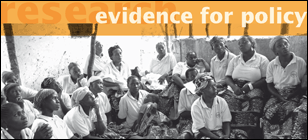
People’s capacity to cope with problems is known as resilience. This issue of evidence for policy describes a model of social resilience and shows how it can be used to address subjects as diverse as preventive medicine, rural–urban migration, and reproductive health. Efforts to build social resilience can strengthen people’s economic ability to face threats, their social networks, and their knowledge and skills to deal with threats competently.
 Download (English / PDF 1 MB)
Download (English / PDF 1 MB)
No. 13 A paradigm shift for improved sanitation: Focus on demand
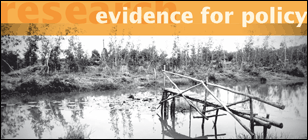
Compared to other types of investment in development, sanitation is very much the poor cousin. Health care, water supplies, education, and other types of infrastructure – they all get a lot more government attention and donor funding than toilets and sewage disposal. This is despite the vital role that good sanitation and hygiene play in maintaining health and economic growth. This global issue of
evidence for policy looks at why this is, and what can be done about it.
 Download (English / PDF 830 KB)
Download (English / PDF 830 KB)
No. 12 Threats and opportunities for smallholders in rural development
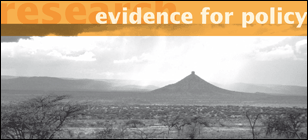
Rural development and smallholders’ livelihoods are attracting renewed attention because of concerns over climate change. But other trends will have an even bigger effect on them in the near term: rising food prices due to changing consumption patterns and speculation, increasing food insecurity, and rapid economic growth in big developing countries. In addition, biofuels compete with other crops for land, and large-scale investors, often foreigners, are investing in agricultural land in developing countries. This policy brief highlights the risks and possibilities for smallholders to harness these trends.
 Download (English / PDF 741 KB)
Download (English / PDF 741 KB)
No. 11 Upholding Health for All
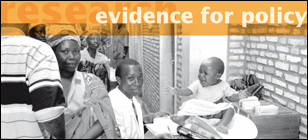
“The enjoyment of the highest attainable standard of health is one of the fundamental rights of every human being.” But in 2013 we are still far from fulfilling this statement by the World Health Organization. Progress has been made towards the three health-related Millennium Development Goals, but big differences remain between developed and developing regions. Poor health is not just a consequence of disease: it is also closely linked to social, economic, and political factors. This issue of
evidence for policy examines what needs to be done to account for these factors.
 Download (English / PDF 733 KB)
Download (English / PDF 733 KB)
No. 10 A four-way win for agricultural development
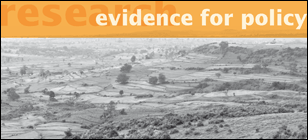
Rural farming areas in the developing world face major environmental, social, and economic challenges. Environmental problems include soil depletion and erosion, flooding, and a changing climate. Despite increasing urbanisation, rural areas are still home to half the world’s population. About 2.6 billion people are directly engaged in small-scale farming, and this number is expected to remain fairly constant in the next few decades. How can these agricultural areas tackle the challenge of producing more, while conserving and restoring the environment, and providing farmers a decent living? This policy brief offers guidelines.
 Download (English / PDF 758 KB)
Download (English / PDF 758 KB)
No. 9 The pyramid of business and peace

For most types of business, a conflict is bad news. But businesses often unwittingly contribute to conflict, or at least do nothing to prevent it. What can they do to help build peace? This global edition of
evidence for policy describes three ways in which businesses working in conflict and post-conflict areas can operate: compliance, risk minimisation, and value creation.
 Download (English / PDF 872 KB)
Download (English / PDF 872 KB)
No. 8 State-building, legitimacy, and development in fragile contexts

Many of the world’s poor live in “fragile” states. Supporting the development of strong, accountable states is viewed as a crucial challenge for the international community. But as this policy brief explains, sustainable states cannot be engineered through outside interventions. State-building processes can at best be accompanied. To aid state-building, external actors must first strive to understand each state for what it is: how its institutions work, how political legitimacy is constructed, and how state-building processes are locally negotiated.
 Download (English / PDF 1 MB)
Download (English / PDF 1 MB)
No. 7 Ensuring land rights benefit the poor
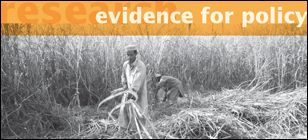
Secure rights to property are necessary for many of the world’s poor to escape poverty. But attempts to strengthen private- and common-property regimes have not always produced the intended results. Local disputes often arise, since land rights are subject not only to government regulation, but also to customary norms. As this policy brief argues, pro-poor property reforms must be accompanied by efforts to strengthen local acceptance by considering customary practices as well. Support for land and labour productivity is also required, as the poor often lack the means to benefit from land even when their rights are secured.
 Download (English / PDF 1.1 MB)
Download (English / PDF 1.1 MB)
No. 6 ‘Green economy’: development opportunity or buzzword?
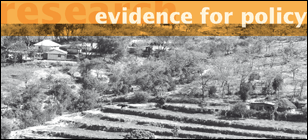
The term “green economy” has dominated international debates on development and environmental policies for the past two years. This can be attributed to the hope that a green economy will be a win–win solution for overcoming the current climate and financial crises. Though closely interlinked, the development agendas of industrialised, transition, and developing countries differ considerably. As this global edition of
evidence for policy outlines, successful achievement of a global green economy will require harmonising these agendas and harnessing the unique potential of each context.
 Download (English / PDF 897 KB)
Download (English / PDF 897 KB)
No. 5 Local solutions for sanitation
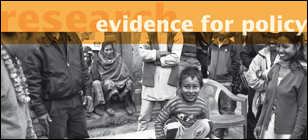
Providing sanitation services is very difficult in developing countries, especially in unplanned settlements in rapidly growing cities. Issue number 5 of
evidence for policy presents alternative technologies and a step-by-step community-based process for improving sanitation in these settings. Case studies from Lao PDR, Nepal, and Tanzania are featured. The researchers recommend placing end-users and local authorities at the centre of planning and implementation, enabling them to select sanitation systems that are appropriate to their household or community.
 Download
Download
No. 4 Natural resources: the climate change challenge

The fourth issue focuses on effective natural resource management in mitigation and adaptation strategies. Topics covered in Natural resources: the climate change challenge include the multiple benefits of restoring soil fertility.
 Download
Download
No. 3 Overcoming ambiguities in decentralisation
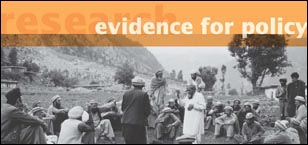
This issue examines case studies in Latin America and South Asia, showing that decentralisation takes place in highly complex and diverse local contexts.
 Download
Download
No. 2 [updated] Making migration safer
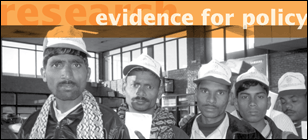
Labour migration in low-skilled sectors plays a vital role in the global economy. Increasing numbers of poor move between their villages of origin, capital cities, and international destinations, while financially sustaining their families and home countries. But while both sending and host countries profit from these migrants’ labour, the migrants themselves are often left vulnerable by public policy at home and abroad. Drawing on case studies in Central and South Asia, this issue of
evidence for policy examines the challenges of making migration safer and more beneficial for low-skilled workers
 Download (English / PDF 1.3 MB)
Download (English / PDF 1.3 MB)
No. 2 Making migration safer
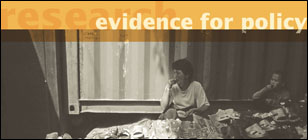
The second issue examines the challenges of making migration safer.
 Download
Download
No.1 Conservation in protected areas: Do local people benefit?
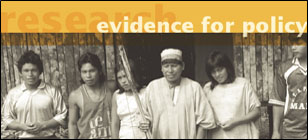
This issue deals with the challenges of integrating participatory approaches in the governance of protected areas.
 Download
Download